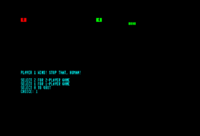Post by hydrophilic on Apr 25, 2019 0:51:43 GMT
Here is a simple game for your C128. With moderate editing it could run on C16|Plus/4. With major editing it could run on C64/PET/VIC20.
The objective is to reduce either of two "piles of stones" to zero. Players alternate turns, and on each turn the active player may "choose" how many stones to remove from the larger pile. The available "choices" are always a multiple of the smaller pile.
Note if you did not go first, you may have only one "choice" (which is to say, no choice at all!) This is really frustrating if you are on the "receiving" end... but quite delightful if you can "impose" this on your opponent!
The game will run in either 40-column or 80-column mode. In 80-column mode you can use FAST/2MHz operation.
You can use either upper-case(ASCII) or lower-case(PETSCII) font, but in lower-case mode the "stones" will appear as "Q"s.
You can use either keyboard or joystick (port 2) for input... or both if 2-player game.
Note the joystick control is a bit touchy at 2MHz... at Super CPU speeds it would probably be unplayable. Imagine that... an interpreted BASIC that is too fast!

Once either pile is reduced to zero, the winner will be reported (whoever made the last move). In a 1-player game the computer will also make a comment... rarely friendly and occasionally violent (depending on the computer's "frustration").

Download D64 disk image
Personally I don't really like this game. It feels a lot like Black Jack or Poker (at least at the lower levels). In summary,
The objective is to reduce either of two "piles of stones" to zero. Players alternate turns, and on each turn the active player may "choose" how many stones to remove from the larger pile. The available "choices" are always a multiple of the smaller pile.
Note if you did not go first, you may have only one "choice" (which is to say, no choice at all!) This is really frustrating if you are on the "receiving" end... but quite delightful if you can "impose" this on your opponent!

The game will run in either 40-column or 80-column mode. In 80-column mode you can use FAST/2MHz operation.
You can use either upper-case(ASCII) or lower-case(PETSCII) font, but in lower-case mode the "stones" will appear as "Q"s.
You can use either keyboard or joystick (port 2) for input... or both if 2-player game.
Note the joystick control is a bit touchy at 2MHz... at Super CPU speeds it would probably be unplayable. Imagine that... an interpreted BASIC that is too fast!


Once either pile is reduced to zero, the winner will be reported (whoever made the last move). In a 1-player game the computer will also make a comment... rarely friendly and occasionally violent (depending on the computer's "frustration").

| Rated PG by the Hydrophilic Association of Video Games For the use of racist/terrorist dialogue |
Download D64 disk image
Personally I don't really like this game. It feels a lot like Black Jack or Poker (at least at the lower levels). In summary,
- 40% of games seem impossible to win (unless your opponent does something stupid)
- 10% of games seem guaranteed to win (unless you do something stupid)
- 50% of games might be winnable (good strategy, no mistakes)
Please note the percentages above are NOT accurate figures for Black Jack/Euclid/Poker games... this is just how it "feels" when I play!
However, it is an interesting exercise in modulo arithmetic. And wikipedia reports there is an optimal strategy. Fortunately for you (the player), the CPU opponent does not use the optimal strategy. Good luck figuring it out for yourself!
I will say the best strategy is related to the fundamental theorem of arithmetic (i.e., factorization of an integer into a product of prime numbers). Besides the "play value", the game concepts have practical applications in fields like statistics and cryptography.
